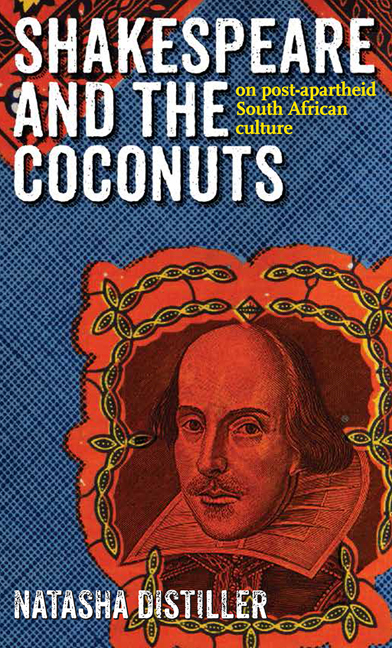Book contents
- Frontmatter
- Contents
- Acknowledgements
- Introduction
- Chapter 1 Shakespeare in English, English in South Africa
- Chapter 2 ‘Through Shakespeare's Africa’: ‘Terror and murder’?
- Chapter 3 Tony's Will: Titus Andronicus in South Africa, 1995
- Chapter 4 Begging the questions: Producing Shakespeare for post-apartheid South African schools
- Chapter 5 English and the African Renaissance
- Chapter 6 Shakespeare and the coconuts
- Endnotes
- Bibliography
- Index
Chapter 3 - Tony's Will: Titus Andronicus in South Africa, 1995
Published online by Cambridge University Press: 21 April 2018
- Frontmatter
- Contents
- Acknowledgements
- Introduction
- Chapter 1 Shakespeare in English, English in South Africa
- Chapter 2 ‘Through Shakespeare's Africa’: ‘Terror and murder’?
- Chapter 3 Tony's Will: Titus Andronicus in South Africa, 1995
- Chapter 4 Begging the questions: Producing Shakespeare for post-apartheid South African schools
- Chapter 5 English and the African Renaissance
- Chapter 6 Shakespeare and the coconuts
- Endnotes
- Bibliography
- Index
Summary
This chapter examines the writing about a production of Titus Andronicus, which starred expatriate South African Anthony Sher. The production was co-conceived with, and directed by, Sher's British partner, Gregory Doran. Originally staged in South Africa in 1995, the production subsequently toured England and Spain with its South African cast. The process of staging Titus, and the two men's responses to critiques of the play, were documented in Woza Shakespeare!, published in 1996, apparently the diary kept by Sher and Doran during the production's various runs. The production was filmed at the Market Theatre by the South African Broadcasting Corporation, so a representation of Sher and Doran's play survives. Reviews of the play and the book from both South Africa and England were numerous, which means ample material documenting the reception of the play is also extant.
From the reviews it is possible to develop an idea of a range of audience members’ responses to the play. In addition, the personal record that is Woza Shakespeare! offers an opportunity to trace the production and reception of a very particular Shakespeare production, in a very particular locale, from the point of view of its principal producers and its lead actor. What becomes clear from an investigation of the play's incarnation in South Africa in 1995, and an exploration of Sher's extended textual self-fashioning, is that particular constructions of the ‘Shakespearean’ and of the ‘South African’ are at work in the various texts that comprise the traces this production has left behind. Titus Andronicus at the Market Theatre in newly postapartheid South Africa becomes a vehicle for Sher as a white sometimes-South African to search for an identity. Some of the strategies available to his identity formation are enabled by ‘Shakespeare’ (the icon) and the play Titus Andronicus, as both become conduits through which Sher channels his sense of self. ‘South Africa’ and particular notions of the ‘African’ are equally available as ideological constructions, and are invoked in a particular relation to Sher's sense of ‘England’ and ‘English culture’.
Sher's work on Titus Andronicus chronicles some of the meanings of ‘Shakespeare’ for particular identity positions in a neo-colonial world, and particularly for certain groups of white people in post-apartheid South Africa.
- Type
- Chapter
- Information
- Shakespeare and the Coconutson post-apartheid South African culture, pp. 71 - 96Publisher: Wits University PressPrint publication year: 2012

